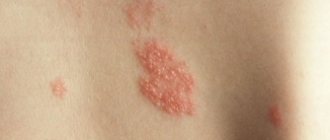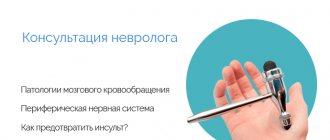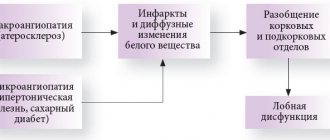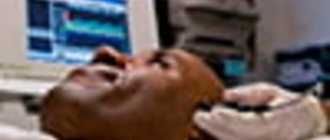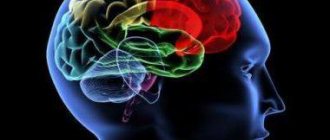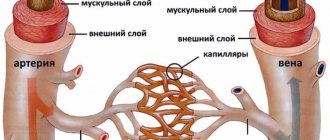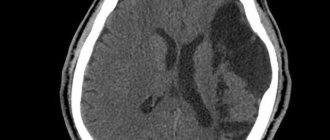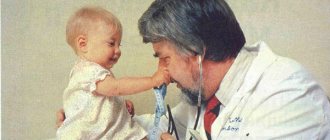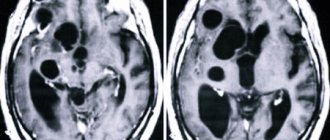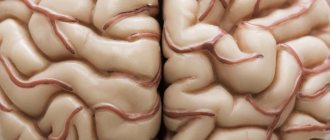Essence and etiology of RCN
Residual cerebroorganic insufficiency (RCI) is considered as residual manifestations arising from damage to the central nervous system.
This can occur during the perinatal (peripartum), childbirth, or infancy period. Official medicine cannot provide an absolutely accurate substantiation of the causes of such a pathology as cerebral insufficiency.
However, risk factors have been identified that increase the risk of developing RCN. These include:
- late pregnancy (woman’s age – 40 years or more);
- infection of the expectant mother with one or another virus (especially if this happened in the first trimester, when the developing fetus is most vulnerable);
- living of a pregnant woman in unfavorable environmental conditions;
- a pregnant woman being in a state of constant stress or depression;
- heavy physical labor during pregnancy;
- attempts to terminate pregnancy;
- premature birth;
- the expectant mother abuses alcohol, takes drugs, smokes;
- placental abruption, which provokes impaired cerebral circulation and oxygen starvation of the fetus;
- injury to the child during childbirth;
- head injuries received by the child after birth;
- introduction of a drug into the mother’s body for the effect of anesthesia during surgical interventions, including during caesarean section;
- immunological incompatibility between the mother and the child she is carrying.
Cerebral insufficiency syndrome can also manifest itself as a hereditary pathology.
A pediatric neurologist can diagnose such a deviation. If you do not start treating a child at an early age, the pathology will progress and the severity of symptoms will become more pronounced. Dealing with RCN is not easy. The child will need not only medical help, but also support from parents, teachers, and psychologists.
At an appointment with a neurologist: is your child’s nervous system ready for school?
Terms of use
Ekaterinburg 01.10.2015
This User Agreement (hereinafter referred to as the Agreement) applies to the website Virtual Health Center (hereinafter referred to as VHC) “Young Mother”, located at www.ymama.ru. The website https://ymama.ru (hereinafter referred to as the Website) is the property of Group LLC. This Agreement governs the relationship between the Site Administration and the User of this Site. Site Administration - employees authorized to manage the Site and acting on behalf of Group LLC. Site user (hereinafter referred to as the User) is an individual who has access to the Site via the Internet and uses the Site. 1. Subject of the agreement. 1.1. The site administration provides the User with the opportunity to access the Site https://ymama.ru, as well as providing the User with access to the articles contained on the Site and the services provided. 1.2. The site provides information and educational services for the population of the Russian Federation, including information and educational programs and consultations with practicing doctors and specialists in the field of preserving and strengthening the health of mothers and children, preparing for childbirth, psychophysical development and raising a child, and promoting a healthy lifestyle. Services are provided using modern Internet technologies, in the format of webinars and online broadcasts (hereinafter referred to as Webinars). 1.3. The User agrees to use the Site under the terms of the Agreement. 2. Procedure for registration and use of the Site. 2.1. To register on the Site, the User fills out the appropriate fields in the registration form - Application for participation in the Webinars of the All-Russian Central Center “Young Mother” and accepts the terms of the Agreement. 2.2. Upon completion of registration, the User receives information in the form of emails and SMS messages via communication channels (SMS mailing) to the email address and mobile phone number specified by the User in the Application for the purpose of organizing the educational process, sending important notifications, such as changes in regulations , conditions and policies of the All-Russian Center “Young Mother”. 2.3. After a successful registration procedure, the User receives an active individual link to participate in a free Webinar at the All-Russian Center “Young Mother”. 2.5. The User is obliged to use the Site in good faith, without violating the legislation of the Russian Federation, the rights and freedoms of third parties, morality and ethics. 3. Webinars. 3.1. Conditions. 3.1.1. The site administration organizes Webinars at the Young Mother Exhibition Center 3.1.2. The user is informed that by participating in the Webinars of the All-Russian Central Center “Young Mother”, he receives information on a specific topic stated in the preliminary schedule. 3.1.3. The site administration can add both paid and free Webinars at any time at its discretion. 3.1.4. The site administration may at any time, at its sole discretion, change topics, change content, and, if necessary, replace presenters of Webinars. At the same time, the Site Administration guarantees that such changes will not lead to a deterioration in the quality of the Webinars. 3.1.5. The user must independently monitor changes in the schedule. 3.1.6. In case of changes in the schedule, information about this appears on the website www.ymama.ru and in the group on the social network VKontakte https://vk.com/virtualnaja_shkola_roditelej1 3.1.7. Registration for Webinars is carried out in three ways: through the website www.ymama.ru, through the link to the miropolis program provided in the schedule, or through email 3.2. Carrying out. 3.2.1. Information at the Webinars of the Young Mother VCR is provided to the User using the following means: Oral presentation by the Webinar presenter, a graphic presentation with photographs, images and text. 3.2.2.. The Webinar presenter does not advertise or provide information on specific medical products or medical centers providing the described medical service, except in cases of cooperation with advertisers. 3.2.3. The Webinar presenter does not comment on the quality of work of a particular specialist. 3.2.4. The user has the right to ask clarifying questions using the chat at the bottom of the screen, the Webinar presenter has the right to answer questions both promptly and after the fact, after waiting for the end of the lecture. 3.2.5. The Webinar presenter has the right not to answer a question without explaining the reasons. 3.2.6. If your question was not read out loud and remained unanswered, there is a need to duplicate it; perhaps the specialist accidentally missed it. 3.2.7. If a Webinar participant uses obscene language, insults other participants or the presenter, or interferes with the conduct of the lesson, he will be immediately disconnected from the Webinar program without explanation. 4. Intellectual property and restrictions when using the Site. 4.1. The site contains the results of intellectual activity belonging to the NGO "GC MM-Forum" 4.2. By using the Site, the User acknowledges and agrees that all content of the Site and the structure of the content of the Site are protected by copyright, trademark and other rights to the results of intellectual activity, and that these rights are valid and protected in all forms, on all media and in relation to all technologies, whether currently existing or developed or created subsequently. No rights to any content of the Site, including, but not limited to, audiovisual works, notes, images, literary works, educational and methodological materials, trademarks, are transferred to the User as a result of using the Site and concluding the Agreement. 4.3. When quoting materials from the Site, the User undertakes to provide a link to the Site. 5. Personal data and their use 5.1. The User gives his consent to the Site Administration to process personal data provided during registration, namely: 5.1.1. Full Name; 5.1.2. Date of Birth; 5.1.3. City of residence; 5.1.4. Mobile phone number; 5.1.5. E-mail address; 5.1.6. gestational age (if required) 5.2. The user is warned that all information received by him at Webinars and in articles on the site is advisory in nature. To establish the correct diagnosis, you need a face-to-face consultation with a doctor! 5.3. The User confirms that the mobile phone number he specified is a personal phone number allocated by the cellular operator, and the User is ready to bear responsibility for the negative consequences caused by his indication of a mobile phone number belonging to another person. 5.4. The user confirms that the specified email address is a personal email address, and is ready to bear responsibility for the negative consequences caused by specifying an email address belonging to another person. 5.5. Processing of personal data means recording, systematization, accumulation, storage, clarification (updating, changing), extraction, use, transfer (distribution, provision, access), depersonalization, blocking, deletion, destruction of personal data that does not fall under special categories for processing which, in accordance with the current legislation of the Russian Federation, requires the written consent of the User. 5.6. The processing of personal data is carried out in order for the Organizer to fulfill its obligations to the User under the Agreement, to provide the User with feedback when using Webinars, as well as for the purpose of sending information and other messages to the email address specified by the User during registration. 5.7. The processing of the User's personal data is carried out by the Organizer using databases on the territory of the Russian Federation. 5.8. The user can withdraw consent to the processing of personal data at any time by sending the Organizer an email to the following address: It is also possible to refuse to receive information via email at any time by clicking on the “Unsubscribe” link at the bottom of the letter. 5.9. The user is informed that at any time he can refuse to receive SMS newsletters to the specified mobile phone number by sending an email to the address:
Manifestations of cerebral insufficiency in children
The clinical picture of RCN and its severity depend on the location of the affected area of the brain.
Residual cerebral insufficiency in children is expressed in the following symptoms:
- emotional instability, the child is overly irritable, capricious, his mood changes at lightning speed, parents often lose sight of this symptom, attributing it to characteristics of age.
- rapid fatigue, which occurs even with minor loads, including intellectual ones.
- The child grinds his teeth in his sleep and often wakes up.
- passivity, drowsiness, complaints of headaches and weakness;
- the child’s sensitivity to changes in weather conditions, that is, weather dependence; children experience surges in blood pressure, increased heart rate and even fainting;
- non-standard facial expressions: trembling of eyelids and lips, frequent blinking, twitching of shoulders;
- nervous tic;
- intolerance to noise, loud and harsh sounds, too bright light;
- intolerance to travel in any type of transport, the child feels nausea, even vomiting, lightheadedness;
- The extremities of a child diagnosed with RCON are often cold, no matter how warm it is indoors or outdoors, and the skin may acquire a marbled tint.
Separately, motor disorders should be noted as a clear symptom of cerebral insufficiency. They can be expressed either in inhibition, or, conversely, in impulsiveness and hyperactivity.
The first mentioned state manifests itself in passivity, slowness, and rapid fatigue, the second - in restlessness, excitability, and the need for active pastime. It is difficult to attract hyperactive children to quiet activities: even getting them to sleep is hard work.
You can suspect RCN in a school-age child if he cannot copy individual elements according to the provided model, or misses letters or entire syllables when reading.
In addition, there are also external signs of cerebral insufficiency in the child. This:
- the upper jaw is excessively pushed forward;
- skull deformations;
- wide-set eyes.
Children with RCN often become depressed, behave aggressively, and also throw tantrums. They have a poor appetite. Sometimes phenomena such as increased sweating, convulsions, and chills may be observed.
about the problem
Developmental delay is a collective concept that unites a number of diseases of the nervous and other systems, in which the rate of development of the child is slower than physiological standards, when individual functions lag behind in their development from accepted norms for a given age.
The development of the motor sphere may lag behind: the child begins to hold his head up late, turns over and sits late, or starts walking late. Delayed speech development is possible when the baby begins to speak late or his speech skills and the purity of pronounced sounds suffer.
Depending on the nature of the child’s retardation, the following types of delays are distinguished: speech development delay (SRD), psychospeech development delay (PSRD), mental development delay (MDD), motor development delay (MDD), psychomotor development delay (PDMD).
The main reasons for delayed development of a child are disorders of the brain. Most often, such disorders are caused by damage to the central nervous system (PCNS) and injuries to the cervical spine received during childbirth.
During the birth of a child, a deviation from the normal course of labor may occur, which leads to instant damage to areas of the brain in the form of hemorrhages from vascular rupture or oxygen starvation of brain cells (hypoxia, ischemia) from vascular spasms. Suffered trauma to the central nervous system leads to its improper functioning and delay in the correct development of the child.
A previous injury to the cervical spine aggravates the condition of the damaged brain. Such an injury leads to displacement of the vertebrae and spasm of the neck muscles, resulting in compression of the blood vessels and a deficiency in cerebral blood flow. Under such conditions, the brain does not receive enough oxygen and nutrients it needs for normal development and functioning.
Development is also delayed by injuries and serious illnesses suffered by the child at an early age. In addition, intrauterine infections adversely affect brain development.
The reasons for delayed development of a child include the presence of certain hereditary diseases, dangerous and harmful factors of the mother’s profession, her addictions, poor environmental background, electromagnetic radiation, and the presence of an unfavorable psychological climate in which the child grows up.
In the first years of life, children with developmental delays often cry loudly for the slightest reason and have great difficulty calming down. Such children develop worse: they do not go out for walks, do not demonstrate a complex of animation when their mother appears, do not communicate with adults, and usually have an “empty” look. Later, games, cartoons, listening to fairy tales - everything that requires understanding does not arouse interest in them, or their attention is concentrated for a very short time. The speech of such children is monotonous, slurred, their vocabulary is meager, sometimes completely absent. There are disturbances in coordination of movements; these children begin to sit, stand or walk later. Sometimes their mouth is slightly open and they may drool. In the future, clumsiness of movements, frequent falls, and delays in the formation of motor skills may be noted.
Such children have poor relationships with their peers. From misunderstanding, from the inability to express themselves, children can become withdrawn, angry, aggressive, and depressed.
When such children grow up, they may complain of headaches, they often get motion sickness in transport, they do not feel well in a stuffy room, and they may experience attacks of nausea, vomiting, and dizziness.
There are often problems with intellectual development: children do not understand the meaning of speech, do not distinguish colors, do not learn counting well, and cannot learn the alphabet. Problems with fine motor skills are obvious; they cannot draw or hold a pen or cutlery correctly.
Consequences of uncontrolled development of pathology
If cerebral insufficiency syndrome is not subjected to complex treatment, this may subsequently result in the following complications:
- slow development of the speech apparatus;
- difficulties in developing reading, writing, and counting skills;
- articulatory deviations;
- easily developing dependence on toxic substances and alcohol.
Due to the slow process of mastering speech skills, the child will experience communication difficulties, and due to behavioral deviations, it will not be easy for him to join the team. As a result, “provocateur” situations will arise that incline the child to depression and isolation.
Diagnosis of deviation and modern treatment
Diagnostic examinations of a child with suspected cerebral insufficiency should be aimed at determining the nature and etiology of the abnormality.
In this case, the following clinical research methods are used:
- Electroencephalography of the brain . This is a sensitive method for studying the functioning of the brain based on the study of electrical impulses that emanate from individual areas of the brain. The procedure is characterized by an almost complete absence of contraindications.
- Echoencephalography . The brain is examined using sound waves that are reflected from the surfaces of the meninges, skull bones, and soft coverings of the head. Thanks to this procedure, it is possible to identify pathological changes or processes in the structure of the brain.
- Rheoencephalography of cerebral vessels . The procedure allows you to assess the state of blood circulation and the quality of blood flow through the main vessels.
Of course, in addition to the listed diagnostic methods, the child needs to be examined by an experienced neurologist.
Once the diagnosis is determined, the specialist will prescribe adequate treatment. Its complex includes the following events:
- Drug therapy . In this case, it is indicated to take amino acids (in particular, glycine, lecithin, folic and glutamic acids), hepatoprotectors, antispasmodics, as well as indirect antihypoxants - substances that help saturate the body with oxygen and reduce the need for it. In addition, in case of RCN, nootropic drugs are taken, which have a neurotrophic and neuroprotective effect directly on the central nervous system. Thanks to this, tissue metabolic processes are normalized.
- Vitamin therapy . Particular emphasis is placed on vitamins B6 and B11.
- Transcranial micropolarization . This procedure has a therapeutic effect on the nerve cells of the brain. This happens due to the use of direct current of minimal strength. The benefit of the procedure is that the development of nervous tissue is stimulated and new connections between cells are created. When performing transcranial micropolarization, a special cap with wires is put on the child’s head. The procedure does not cause any discomfort;
- Therapeutic massage , the technique of which is suitable for correcting disorders of the central nervous system. It helps improve blood circulation, strengthens muscles, helps restore nerve tissue and generally improves the child’s vitality.
- Gentle manual therapy techniques . They improve the passage of nerve impulses, stimulate blood circulation, stabilize the patient’s emotional state and help eliminate the effects of stress. The required therapy program is determined by a specialist.
- Also, for medicinal purposes, the child may be recommended swimming .
standard treatment
The first place in the treatment of developmental delay is occupied by drug therapy with drugs that stimulate brain function.
Microcurrent reflexology is a method that involves the impact of ultra-small electrical impulses on biologically active points of the brain, neuroreflex zones. Such impulses make it possible to restore the functioning of the central nervous system in those areas where it was disrupted.
To develop impaired functions, treatment courses include classes with various specialists: speech pathologist, speech therapist, child psychologist.
Physiotherapy, exercise therapy, massage (including speech therapy), hydrotherapy, and osteopathy are also used.
Alternative approaches to the treatment of developmental delays: hippo and dolphin therapy, art and music therapy, development of gross and fine motor skills, various educational games and exercises using foreign and Russian methods.
Participation of parents in the treatment of the child
A child with RCN must constantly feel support from his parents, otherwise the correction process will be incomplete.
Parents must organize a clear daily routine for the child and monitor its compliance. Strict adherence to the rules will lead the nervous, endocrine and immune systems to a state of stability. The transition to such a regime should be gradual, not abrupt.
Parents should also strive to ensure that the child expands his social circle. For this purpose, he can be enrolled in a sports section or some club. This way you can achieve two goals at once: integrate the child into the team and give him the opportunity to develop his talents. When choosing an activity, it is necessary to take into account the wishes and interests of the child.
Cerebral insufficiency, although it occurs due to disorders of the nervous system, is not a death sentence for the child. He will be quite capable of studying, communicating, making a career and starting a family in the future. The only condition for this is timely treatment and the deep involvement of parents in this process.
Perinatal lesions of the nervous system
During the first 3 years of life, a child acquires 50% of the knowledge, skills and abilities that are the basis for subsequent learning. And neurologists call the first year of a child’s life the “golden year” , since it is the most important for the baby.
Disorders of the nervous system caused by the pathological course of pregnancy and childbirth (fetal hypoxia, birth injuries, etc.) must be identified precisely in the first year of a child’s life, when treatment and rehabilitation are most effective.
The term “perinatal lesions of the central nervous system” combines syndromes that arise as a result of brain damage during pregnancy, childbirth and during the first 7 days of life. The prevalence of CNS PP is significantly higher among premature infants, children born with low body weight, and in multiple pregnancies. Risk factors for the development of this pathology are:
- maternal diseases (diabetes mellitus, hypothyroidism, obesity, anemia, cardiovascular pathology);
- occupational hazards, consumption of alcohol, drugs, medications (especially in the early stages of gestation);
- stress and psychological discomfort of a pregnant woman;
- disturbances in the physiological course of pregnancy (chronic intrauterine fetal hypoxia, toxicosis of pregnant women, threat of miscarriage);
- intrauterine infection of the fetus (cytomegalovirus infection, herpes, toxoplasmosis, rubella, etc.);
- immunological incompatibility of mother and fetus (ABO and Rh factor).
A significant place in the development of CNS PP is occupied by fetal asphyxia and birth injuries, which most often occur in the following conditions:
- premature birth;
- clinically narrow pelvis;
- breech presentation of the fetus;
- weakness of labor;
- a long anhydrous period and prolonged standing of the fetal head in the birth canal;
- prolonged or rapid labor;
- caesarean section, instrumental assistance during childbirth.
Clinical symptoms of the disease depend on the severity of the condition, the size and location of areas of brain damage.
Most often, parents note sleep disturbances in the child (light sleep, short sleep), irritability, increased tearfulness, frequent regurgitation, shuddering, trembling of the chin and hands, and throwing back of the head.
In severe cases of the disease, delays in psychomotor development occur and the formation of attitudinal reflexes is disrupted. Such babies later master walking skills, motor clumsiness and delayed speech development are noted.
In preschool and school age, such children are often hyperactive, inattentive, restless, sometimes conflict-ridden, and, compared to their peers, master reading and writing skills worse. In everyday life they are sloppy, forgetful, unnecessary and at the same time ambitious, often striving for leadership in a team.
To prevent the occurrence of such disorders, timely consultation with a pediatric neurologist is extremely necessary.
The cost of a consultation with a pediatric neurologist is 1,800 rubles. Sign up online or request a call back.
The diagnosis of CNS PP is established on the basis of parental complaints, a thorough examination of the medical history with an assessment of existing risk factors, examination of the child, and ultrasound of the brain (neurosonography).
Ultrasound of the brain is a safe, atraumatic and highly informative method for clarifying the nature of disorders and assessing the effectiveness of treatment.
Treatment is aimed not only at restoring existing dysfunctions of the nervous system, but also at preventing the development of new pathological processes in a child with CNS PP. Medicines used in neuropediatrics are safe and are aimed at restoring the metabolism and function of neurons in damaged areas of the brain. Early inclusion in a comprehensive rehabilitation program of non-drug interventions, such as massage, therapeutic exercises using special adapted techniques, physiotherapy, swimming, allows minimizing drug therapy, so these methods are a priority.
The position of parents has a huge role in the implementation of rehabilitation measures and restoration of impaired functions.
Long-term practical observations show that, subject to early diagnosis of central nervous system diseases and early initiation of adequate systematic treatment, there is a significant decrease in the severity of neurological symptoms and restoration of impaired functions.
Pediatric neurologist, doctor of the highest qualification category Ryzhova Victoria Viktorovna
